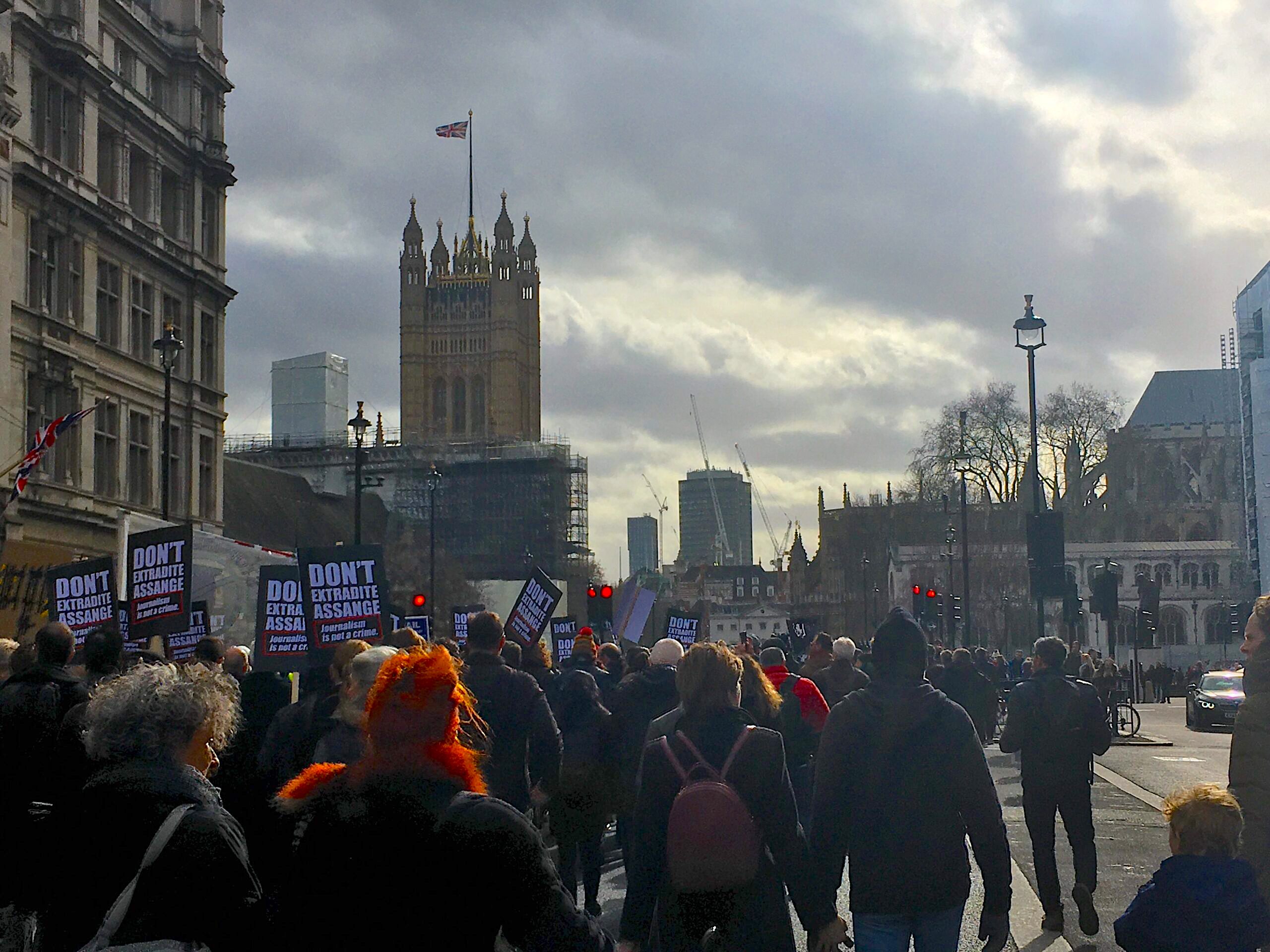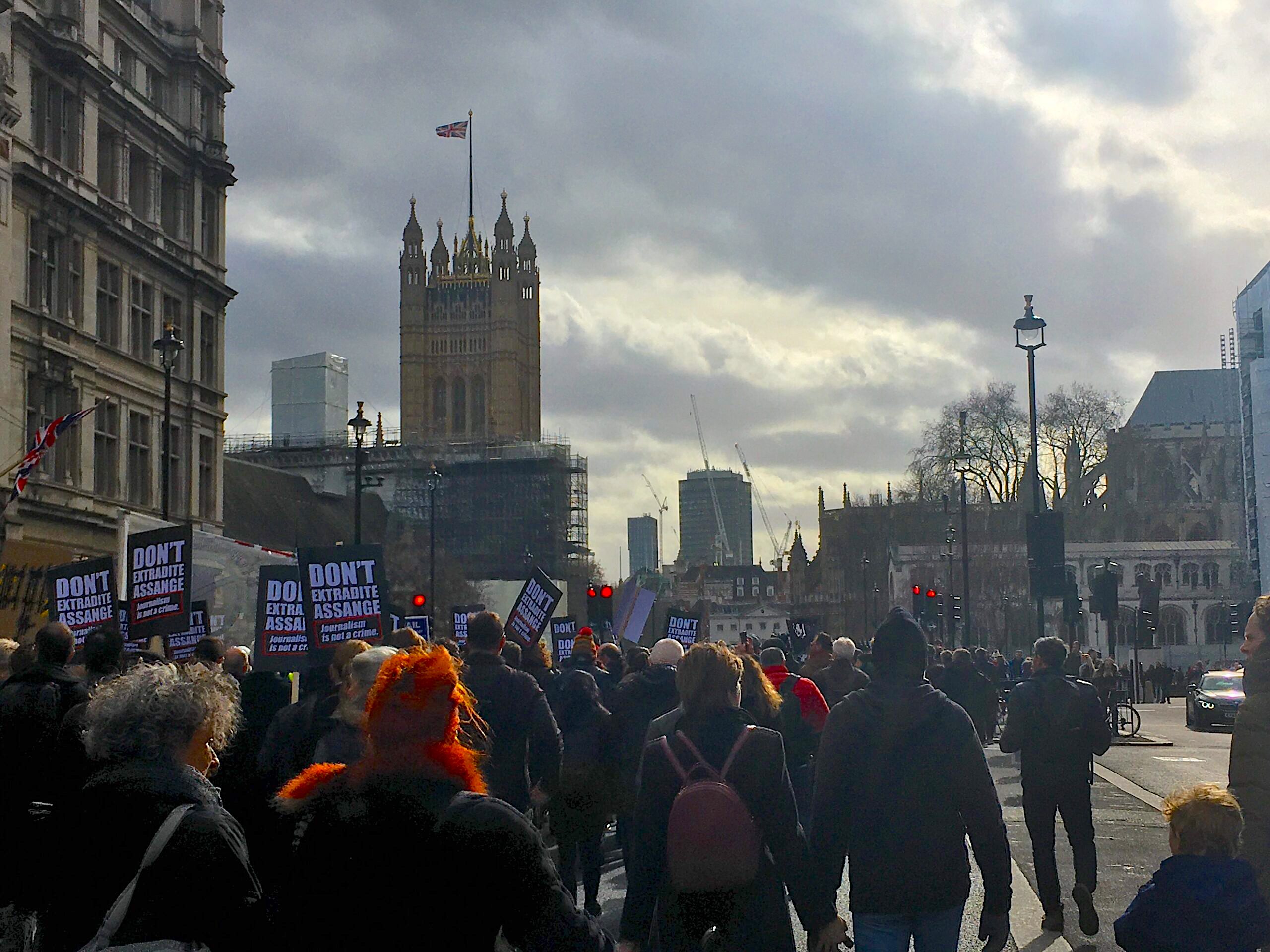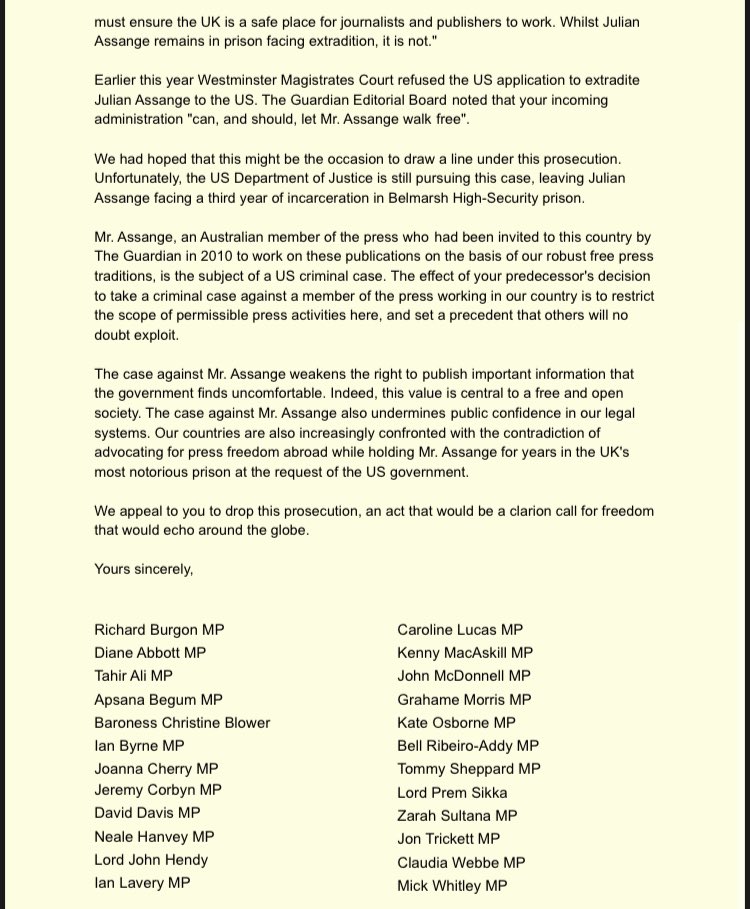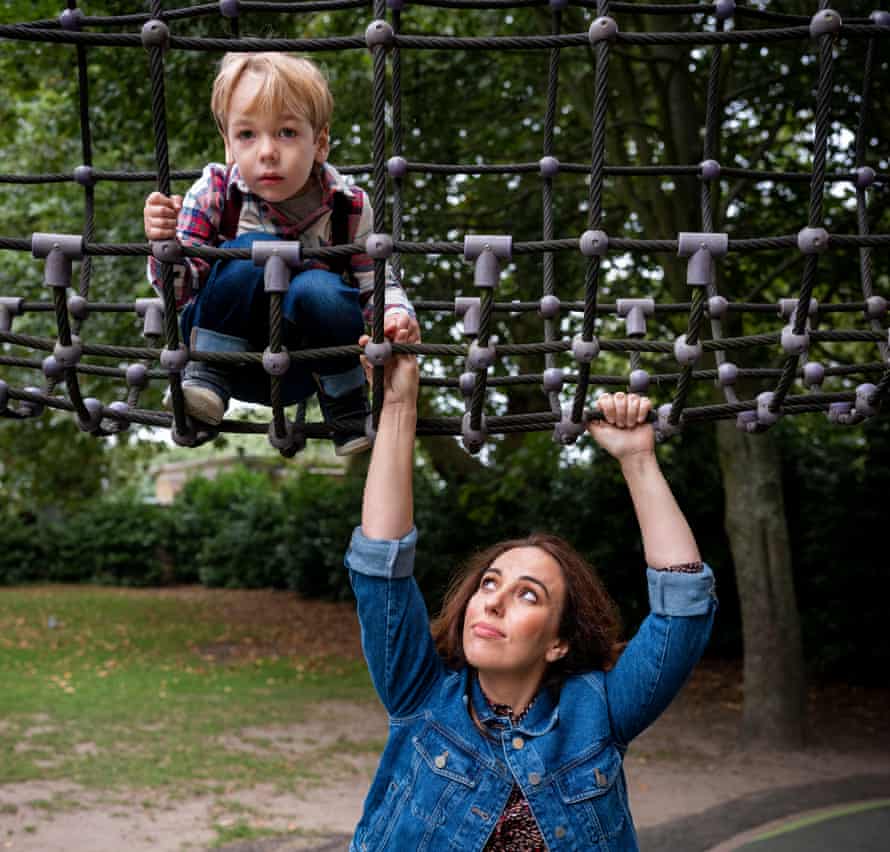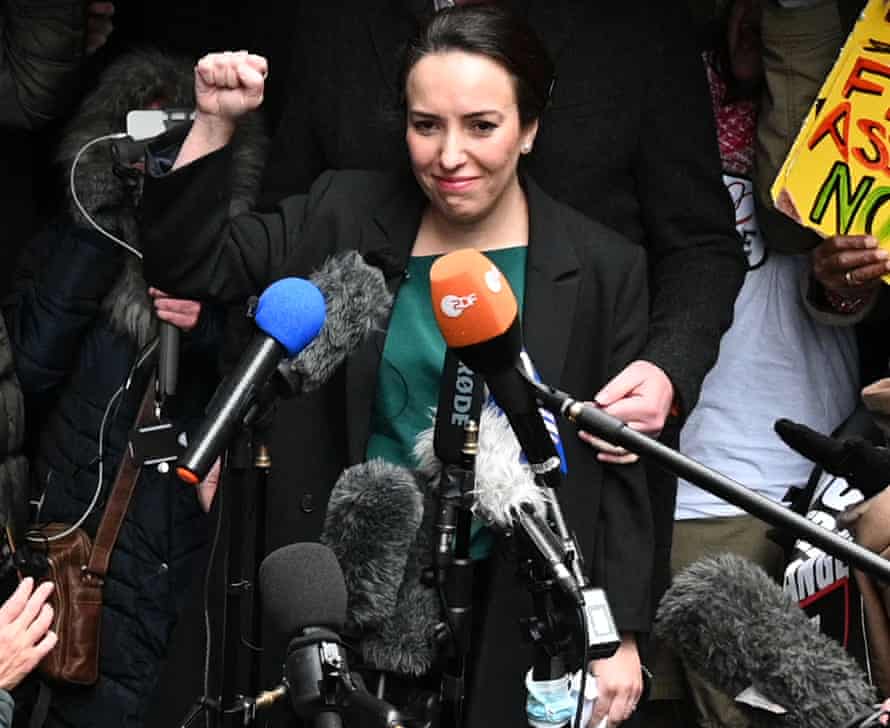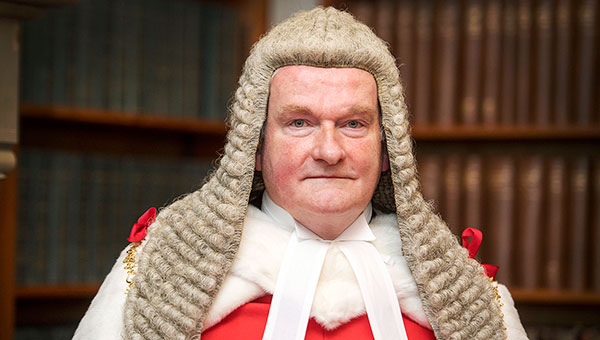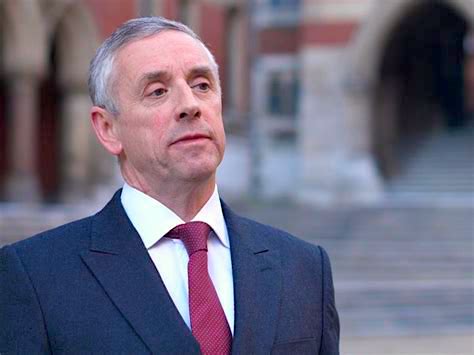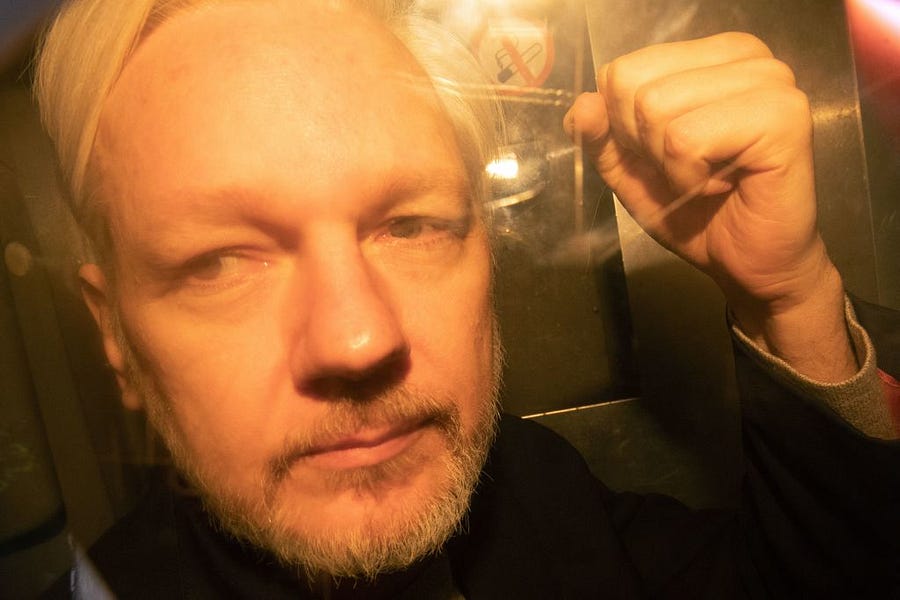Imagine meeting the love of your life but not being able to tell a soul. Then having his children, and not being able to confide in your closest friends who the father is because it may endanger the family. And finally revealing all to the world – but only to help prevent him being extradited from Belmarsh prison in London to America where he faces a jail sentence of up to 175 years under the Espionage Act.
Stella Moris has had a tough time of it. Her face is pale, her voice little more than a whisper, and she barely makes eye contact. The pauses between words are sometimes so long, you fear she’s having a breakdown mid-sentence. And yet there is such defiance in her language, such certainty in the rightness of her cause. A defiance and certainty not unlike that shown by her fiance, WikiLeaks founder Julian Assange, the world’s most famous publisher of classified information. Now she is fighting for his life and her future. And that’s not all. In a couple of weeks at the Royal Courts of Justice, the
US government will appeal against an earlier decision not to send Assange to America. If Assange loses, Moris believes the very concept of a free press will be under threat.
Moris says there is another reason she couldn’t tell people about her relationship with Assange, who has spent the past 11 years in captivity of one kind or another – holed up in a Norfolk stately home, the Ecuadorian embassy, and Belmarsh. Her story had simply become too fantastical – the kind you might find in a melodramatic spy novel. “I couldn’t explain the situation to friends because my circumstances had become quite unrelatable.” It emerged last April that Moris and Assange
had two children while he was in hiding at the embassy. By then, Gabriel was almost three and Max was one. The story came out only because Assange had tried to secure bail with his new family at Moris’s home. Even by Assange’s standards, it was an astonishing revelation. They had managed to keep their relationship from the public for six years.
Moris talks out of the side of her mouth, barely moving her lips, like a character in a 1950s film noir. “I was in an embassy where the authorities were hostile to Julian and threatening to throw him out; where there was a security company secretly
working for the CIA; where I was told not to bring my baby in because it wasn’t safe; where my mom was followed. How do you sit down and have a martini and discuss this with your best friends?”
We meet at the Frontline Club, the London private members’ hotel and bar for journalists, and the scene of Assange’s early triumphs. This is where he held press conferences to discuss the release of the
Afghan war logs, a compendium of more than 91,000 reports covering the war in Afghanistan from 2004 to 2010, and described by the Guardian at the time as the
biggest intelligence leak in history.
Stella Moris’s life has changed beyond recognition over the past decade. When she first met Assange in 2011, she was a 28-year-old lawyer known as Sara Gonzalez Devant. She had been excited by the work of WikiLeaks, believing the nonprofit media organisation was exposing corruption and war crimes in a way never seen before. She mentions one of its most famous scoops – a horrifying video called
Collateral Murder that showed the crew of two Apache helicopters firing on a group of Iraqi civilians with the callous insouciance of video game players. After the lead helicopter fired, one of the crew shouted, “Hahaha. I hit ’em” and another responded, “Oh yeah, look at those dead bastards.”
In April 2010, Assange released the video at a press conference in Washington DC. Overnight,
WikiLeaks – which he had founded four years previously – became a household name. “If Collateral Murder hadn’t been published, those innocent people who were mown down in a war crime would have for ever remained in terms of the official story ‘enemy combatants’ engaged in a war battle and legitimately killed,” Moris says. “And that was only one of the stories.”
Assange certainly wasn’t a conventional journalist. He had started out as a hacker, and in 1991, at the age of 20, was caught breaking into the Melbourne master terminal of Nortel, a Canadian multinational telecommunications company. Five years later, he
pleaded guilty to 24 charges, was ordered to pay reparations of A$2,100 (£1,125) and released on a good behaviour bond (the equivalent of probation). But that was a lifetime ago. Now he was the editor and publisher of WikiLeaks, encouraging the world’s whistleblowers to come to him anonymously.
He had an intense gaze, didn’t do small talk, wanted to know where I was coming from. The day we met, we spoke for two hours
In the case of Collateral Murder,
that whistleblower was a US army soldier stationed in Iraq called Bradley Manning (later Chelsea Manning after transitioning). In early 2010, horrified by the behaviour of colleagues, Manning disclosed nearly 750,000 classified, or unclassified but sensitive, military and diplomatic documents to WikiLeaks, including the Afghan war logs, the
Iraq war logs and more than 251,000 US state department cables written by 271 American embassies and consulates in 180 countries that became known as Cablegate.
Assange teamed up with five major newspapers (the Guardian, New York Times, Der Spiegel, El Pais and Le Monde) who collaborated on publishing the shocking exposés. This meant they shared the work, the risk and the credit, a way of reporting that is now commonplace with mass leaks, such as the
Panama and
Pandora papers. As for Manning, she was now in jail. She had confided to a former hacker, who reported her to the US authorities. Three years later, she went on trial, pleaded guilty and was sentenced to
35 years’ imprisonment. Meanwhile, Assange became a rock star in the rapidly evolving new media world. And he played the part to perfection: bobbed white hair, leather jacket; Jagger-esque swagger. To many, he was a hero – the pugnacious Aussie who gave America a good hiding by revealing what the US military had really got up to in Iraq and Afghanistan. Others regarded him as an egomaniacal information thief. In December 2010, he won the
online readers’ vote for Time magazine’s person of the year.
But by then he, too, was in prison. In August 2010, only a few days after WikiLeaks and its media partners started to publish the Afghan war logs, the Swedish prosecutor’s office issued an arrest warrant following allegations from two women, one of rape and one of molestation. Assange said that in both cases the sex was consensual and the allegations were unfounded. After
nine days in jail, he was bailed to Ellingham House, the stately home owned by his friend Captain Vaughan Smith, a WikiLeaks supporter who served in the British army before founding the Frontline Club.
Sara Gonzalez Devant first met Assange at Frontline Mews, a property owned by Smith, where Assange initially lived when under house arrest. An expert in international law, she was hired as part of Assange’s legal team to help fight his case against extradition to Sweden. She officially changed her name to Stella Moris in 2012 to protect herself and her family while working with Assange. She chose a common surname (albeit with an unusual spelling) and Stella because she liked it. Nowadays, she says, everybody calls her Stella except her parents.
They found they had much in common. Both were freedom of information champions and had experienced nomadic childhoods. Assange has said he lived in more than 30 Australian towns and attended 37 schools before settling down with his mother and half-brother in Melbourne. She was born in Johannesburg, South Africa, and lived in Botswana, Lesotho, Sweden and Spain before going to university in the UK. Moris’s parents were part of the Medu Art Ensemble, which played a significant role in the struggle against apartheid. Her father, a Swede of Cuban heritage, is an architect/town planner and artist; her mother is Spanish and a theatre director. By chance, Assange’s mother ran a theatre company and his biological father was an architect. “I thought this was a nice coincidence,” Moris says. “It’s not a combination one often comes across.”
Moris attended an international school in Lesotho, which is why she speaks with an American accent today. She did a degree in law and politics at Soas in London, an MSc at Oxford in refugee law, and a master’s in Madrid in public international law. She was a top scholar and in her mid-20s won a place on a prestigious leadership course in Canada. “It is Canada’s equivalent of the Rhodes scholarship,” she says. A year after completing it she went to work with Assange’s legal team.
Moris says she found him fascinating from the off. “He had a very intense gaze. He didn’t do small talk. He wanted to know where I was coming from. The day I met him, we spoke for two hours. I told him about my life. Julian is unlike anyone I have ever met.” Her face lights up; she looks like a teenager in love. “He is very direct, engaging, clever, curious.”
Before even meeting him, she says, she was convinced he was the victim of an elaborate sting. “I had read all the documents and it was clear that this was a political case and that he was innocent. The Swedish authorities were behaving in a way that was inexplicable, refusing to question him. Then it came out that they were being advised by the Crown Prosecution Service not to question him in England. The CPS was pushing for Julian to be extradited, which was also inexplicable.” She shows me a document obtained through a freedom of information request in which a senior CPS lawyer tells his Swedish counterpart “not to get cold feet” over the extradition.
“Why would they do that?” Moris asks. Assange refused to return to Sweden because he believed that he would be more likely to be extradited from there to America, where he would be prosecuted under the Espionage Act.
In May 2012, th
e UK’s supreme court ruled he should be extradited to Sweden. In June, Assange
entered the Ecuadorian embassy, where he could not be arrested because of the international legal protection afforded diplomatic premises, and refused to come out. In doing so, he breached his bail conditions. Two months later, Ecuador granted Assange
political asylum, stating that they feared his human rights would be violated if he were extradited.
By now, Assange had fallen out with former colleagues at WikiLeaks and collaborators at mainstream news organisations. His relationship with the Guardian soured over the decision to bring the New York Times into the collaboration, and he was angered that the Guardian investigated the Swedish allegations, rather than supporting him unquestioningly. He was also furious about details published in a Guardian book,
WikiLeaks: Inside Julian Assange’s War on Secrecy. Meanwhile, all five media partners
condemned his decision to publish Cablegate unredacted, potentially endangering the lives of thousands of activists and informers in countries including Israel, Jordan, Iran and Afghanistan. The situation could not have been messier.
Assange on the balcony of the Ecuadorian embassy in 2017. Photograph: Justin Tallis/AFP/Getty Images
He fell out with so many people: WikiLeaks staff, his lawyer Mark Stephens, the writer Andrew O’Hagan, who had been contracted
to ghost a book out of him, which Assange never delivered. Laura Poitras’s film about Assange,
Risk, is particularly poignant because she had started the project as a fan. In it, Assange comes across as vain, sexist, arrogant and messianic. The allegations of hypocrisy were most damaging: Poitras reveals that Assange told her the film was a threat to his freedom and demanded scenes be removed. “He was really angry and he tried to intimidate,” Poitras told me at the time of Risk’s release.
James Ball, global editor at the Bureau of Investigative Journalism and former Guardian journalist, briefly worked for WikiLeaks. He talks about the “incredible intensity” of his time at Ellingham House. “We were in the middle of nowhere in Norfolk, and we couldn’t bring phones because they could be tracked, so we were cut off from friends and family.” Ball challenged Assange when he was asked to
sign a non-disclosure agreement, with a £12m penalty clause, that would have prevented him saying anything about WikiLeaks for two decades. “Julian basically told everyone not to let me go to bed till I agreed to sign,” Ball says. Eventually, he did get to bed without signing. “I was woken up by Julian who was sitting on my bed, pressuring me again. He was prodding me in the face with a cuddly toy giraffe. I managed to get out, and then I got really angry for several months. A friend suggested I look into cult deprogramming. I don’t think Julian necessarily meant to build a cult, but WikiLeaks did operate like one.”
Moris dismisses all the criticism of Assange as character assassination. Does she think his reputation for being difficult is fair? “How many publishers, editors, CEOs have a reputation for being nice and agreeable?” she asks. “Julian doesn’t like people who are deceitful, Julian doesn’t like opportunists, and he can be quite direct. Also people who are on the autism spectrum don’t score particularly high on the agreeableness scale.” (A psychiatrist
confirmed a diagnosis of Asperger syndrome in last year’s extradition hearing.)
After Assange entered the embassy in 2012, he and Moris became close. “I spent a lot of time with him. I got to know him,” she says. When did she realise she was falling in love with him? “2014, two years later.” Did she resist it? “Initially, yes, because it made things more complicated. But in the end, no.” Did Assange see the difficulties? “He’s a romantic.” Which is a no. “It’s such a miracle when you do fall in love,” Moris says, “when you find someone you’re compatible with.”
We set up a tent for privacy, but the cameras multiplied until there was nowhere to go without one hanging over you
How difficult was it to conduct a relationship in the embassy? “We knew where the cameras were.” She laughs, high-pitched and happy, like a whistling kettle. By now she was more campaigner than lawyer, and often stayed late into the night or overnight. “We set up a tent for privacy and escapism – it was quite cosy. The cameras multiplied over time. Eventually there was nowhere to go without one hanging over your head. The Times ran a story that strongly suggested that there was intimate footage of us being shopped around.” When she found out she was pregnant, they had to be even more discreet. “We never showed affection in front of people. Some conversations we had on paper, like when I told him I was pregnant.”
In the end, Assange spent seven years at the embassy. Towards the end, the atmosphere became progressively more hostile, Moris says. They began to suspect that UC Global, the Spanish security company there to protect him and the embassy, was spying on him for the Americans. At an extradition hearing, the court heard that microphones were concealed to monitor Assange’s meetings with lawyers, his fingerprint was obtained from a glass, and there was even
a plot to obtain a nappy from a baby who’d regularly visited the embassy.
The unnamed baby was Moris and Assange’s elder son, Gabriel. She believes the security firm had hoped to obtain DNA from the nappy to discover whether Assange was Gabriel’s father, but the plot was thwarted. “A security guard approached me in December 2017 and told me not to bring Gabriel in any more,” Moris says. “It was the guard who had been instructed to steal the nappy. I guess it was a sense of moral disgust. It was no surprise when allegations were made in court about plots to kidnap or poison Julian. It was like a black site in the middle of London. Complete lawlessness.”
Surely she and Assange must have feared bringing children into that environment? “Well, from that point when we heard of the nappy, yes.” But, she says, back when she got pregnant, things were more hopeful: to Moris, it seemed only a matter of time before Assange would be freed. “I was 32, 33 and we decided to start a family. Sure, not the ideal circumstances, but it felt right.” She pauses. “It
was right.” She hid her pregnancy by wearing baggy clothes and saying she had put on weight. When did she tell her parents about her relationship with Assange? “When I was pregnant.” Were they like: “I knew it was him all along!” “My mom was, yeah!” How did she know? “Moms
know!” She tells me how much her parents admire Assange.
How did she manage to keep the children secret from everybody else for so long? “It was very stressful and very difficult.” I ask if she had to lie a lot. There’s a big pause, even by her standards. “Yep.” Had she lied a lot previously? “No, I found it very difficult. It wasn’t so much lying as saying: ‘I’m not going there’ when people asked, ‘Who’s the dad?’Which I felt bad about.”
Moris says that over the past decade she has necessarily become increasingly private. “Anyone in Julian’s vicinity was exposed to being approached openly or covertly by agents.” She stops and laughs at herself. “Agents! It sounds so conspiratorial! But, basically, people were spying on Julian. I didn’t want to put friends in a position where they might risk exposing him.”
When the relationship with the embassy was good, Moris says, it was a sociable place. Assange was visited frequently by friends, who would stay late working, chatting around the dinner table and watching movies. But after Gabriel was born, she says the atmosphere had changed. “There were periods when I thought, maybe irrationally, that they could kill me just to get at Julian, or attack me. I was thinking when I went home at night people were following me, and were going to beat me up. They were trying everything they could to drive Julian out of the embassy.” Who are “they”? “The Ecuadorian authorities, but implicitly with the US.”
‘Julian is a good father’: Moris with Gabriel. Photograph: Harry Borden/The Guardian
While Assange was being spied on at the embassy, Ecuador’s then president, Lenín Moreno,
accused him of spying on other states from the embassy, and said this violated asylum conditions. As happened so often in Assange’s life, there was a loss of trust and the relationship disintegrated. In October 2018, Assange was given a
set of house rules by the embassy and further restrictions were introduced – Moris and the few designated visitors were allowed access only during specific visiting hours, and not at weekends. She believes the embassy was “trying to suffer Julian out of the embassy”. Assange accused the embassy of violating his “
fundamental rights and freedoms” and said he was launching legal action against the government of Ecuador.
In November 2018, Moris stopped going into the embassy altogether. She was heavily pregnant with their second son, Max, and feared that if discovered, it would be used as a pretext to expel Assange from the embassy. She tried to see him after Max was born, but wasn’t allowed in. The next time she saw him was in Belmarsh prison, five months later.
On 11 April 2019, Ecuador withdrew its diplomatic asylum and the Metropolitan police entered the embassy. Assange was detained for “failing to surrender to the court” over a warrant issued in 2012 and sent to Belmarsh. In May, he was sentenced to 50 weeks in jail for breaching bail conditions.
Soon after Assange was arrested at the embassy, he was indicted on 17 charges for violating the Espionage Act by publishing classified information, and one charge of conspiring to hack into a secret Pentagon computer network. If found guilty, he faces a maximum 175 years in jail. In November 2019, Sweden dropped the rape investigation (the deadline for bringing charges on the sexual assault allegation expired in 2015). But it provided little comfort for Assange. By now America was set on extraditing him.
It’s no surprise that Moris looks stressed. I ask her what it’s been like to bring up the children as a single parent. “I called in my family to help out. It would have been impossible otherwise. It is exhausting. And it is incredibly stressful. When somebody you love is being hurt, it hurts you, too.” Is she getting therapy? “No. I’ve thought about it. But on the other hand I’m not sure I want to open that door to somebody else.”
She talks about how difficult it has been to take the boys to visit their father in prison under Covid restrictions. “Between March 2020 and June this year, they saw him three times, and even when they saw him he wore a face mask and visor so they couldn’t see him properly. Now at least the kids can hug him and I can hug him. The children are very affectionate with him – so natural.”
Gabriel and Max are now four and two respectively. Has she explained the concept of prison to them? She shudders and says no, they are too young. “I tell them,‘We are going to visit the big place where Daddy is. It’s not Daddy’s home, but it’s the big house that Daddy’s in.’ I say that there are some people who don’t want him to come, but there are many more who do want him to. It’s becoming increasingly difficult to make sense of the situation to them.”
Moris says she knows he will be a good father to them. “In Belmarsh, he reads the kids children’s stories. He teaches them. There’s a little tuck shop in the prison, and they opened it for the first time since March 2020 last week. We bought some chocolate, and he was giving them a Malteser one at a time and he said, ‘If you eat it slowly, you get two.’ He was teaching them that if they ate them slowly they’d be rewarded. They liked that game.” Did it work? “Yeah, it did. Julian is a good father. He was like a tiger mom for his eldest son.” Assange’s oldest son Daniel is 31. (His former WikiLeaks colleague Daniel Domscheit-Berg wrote in his book
Inside WikiLeaks that Assange would often boast about having at least
four “love children” , saying: “He seemed to enjoy the idea of lots and lots of Julians, one on every continent.”) In what way was Assange a tiger mom to Daniel? “He put him in the best schools, and he was a single father. He taught him how to code at a young age. They would perform a Greek tragedy, the two of them together.” She pauses. “I don’t know whether he wants me to tell this story. I’ll probably get it wrong.”
Moris is wearing a diamond engagement ring. I ask if she had to buy it herself. “Yeah,” she says. Was it a happy or sad occasion? “Happy! I consulted with Julian. I described it to him. For the first year or so, I was wearing my mom’s engagement ring.” There have been stories that they will get married in Belmarsh. Has that plan been frustrated? “No, it’s just paperwork.”
I ask how Assange is keeping. “He’s very unwell. He’s struggling a lot.” Mentally or physically? “Both. In his wing, one of his closer friends killed himself, then someone else slit his throat.” She makes no secret of the fact she fears Assange may take his own life. Indeed, it formed the major plank of his first hearing against extradition.
It’s now a year and a half since he completed his 50-week sentence for jumping bail. And this is where the
Julian Assange story gets even stranger – if possible. Despite the fact there are no new charges against him in the UK, he is still in the category A prison Belmarsh, where he has spent much of his time in solitary confinement.



